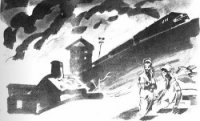A Death In The Family - Agee James (электронные книги без регистрации .TXT) 📗
He looked at her and said to himself: but then they can't see me; but he knew there was no use begging her; already she was busy with the dishes again.
He went back along the hall towards the hat rack. In the first moment he had been only surprised and exhilarated not to have to go to school, and something of this sense of privilege remained, but almost immediately he was also disappointed. He could now see vividly how they would all look up when he came into the schoolroom and how the teacher would say something nice about his father and about him, and he knew that on this day everybody would treat him well, and even look up to him, for something had happened to him today which had not happened to any other boy in school, any other boy in town. They might even give him part of their lunches.
He felt even more profoundly empty and idle than before.
He laid down his satchel on the seat of the hat rack, but he kept his hat on. She'll spank me, he thought. Even worse, he could foresee her particular, crackling kind of anger. I won't let her find out, he told himself. Taking great care to be silent, he let himself out the front door.
The air was cool and gray and here and there along the street, shapeless and watery sunlight strayed and vanished. Now that he was in this outdoor air he felt even more listless and powerful; he was alone, and the silent, invisible energy. was everywhere. He stood on the porch and supposed that everyone he saw passing knew of an event so famous. A man was walking quickly up the street and as Rufus watched him, and waited for the man to meet his eyes, he felt a great quiet lifting within him of pride and of shyness, and he felt his face break into a smile, and then an uncontrollable grin, which he knew he must try to make sober again; but the man walked past without looking at him, and so did the next man who walked past in the other direction. Two schoolboys passed whose faces he knew, so he knew that they must know his, but they did not even seem to see him. Arthur and Alvin Tripp came down their front steps and along the far sidewalk and now he was sure, and came down his own front steps and halfway out to the sidewalk, but then he stopped, for now, although both of them looked across into his eyes, and he into theirs, they did not cross the street to him or even say hello, but kept on their way, still looking into his eyes with a kind of shy curiosity, even when their heads were turned almost backwards on their necks, and he turned his own head slowly, watching them go by, but when he saw that they were not going to speak he took care not to speak either.
What's the matter with them, he wondered, and still watched them; and even now, far down the street, Arthur kept turning his head, and for several steps Alvin walked backwards.
What are they mad about?
Now they no longer looked around, and now he watched them vanish under the hill.
Maybe they don't know, he thought. Maybe the others don't know, either.
He came out to the sidewalk.
Maybe everybody knew. Or maybe he knew something of great importance which nobody else knew. The alternatives were not at all distinct in his mind; he was puzzled, but no less proud and expectant than before. My daddy's dead, he said to himself slowly, and then, shyly, he said it aloud: "My daddy's dead." Nobody in sight seemed to have heard; he had said it to nobody in particular. "My daddy's dead," he said again, chiefly for his own benefit. It sounded powerful, solid, and entirely creditable, and he knew that if need be he would tell people. He watched a large, slow man come towards him and waited for the man to look at him and acknowledge the fact first, but when the man was just ahead of him, and still did not appear even to have seen him, he told him, "My daddy's dead," but the man did not seem to hear him, he just swung on by. He took care to tell the next man sooner and the man's face looked almost as if he were dodging a blow but he went on by, looking back a few steps later with a worried face; and after a few steps more he turned and came slowly back.
"What was that you said, sonny?" he asked; he was frowning slightly.
"My daddy's dead," Rufus said, expectantly.
"You mean that sure enough?" the man asked.
"He died last night when I was asleep and now he can't come home ever any more."
The man looked at him as if something hurt him.
"Where do you live, sonny?"
"Right here"; he showed with his eyes.
"Do your folks know you out here wandern round?"
He felt his stomach go empty. He looked frankly into his eyes and nodded quickly.
The man just looked at him and Rufus realized: He doesn't believe me. How do they always know?
"You better just go on back in the house, son," he said. "They won't like you being out here on the street." He kept looking at him, hard.
Rufus looked into his eyes with reproach and apprehension, and turned in at his walk. The man still stood there. Rufus went on slowly up his steps, and looked around. The man was on his way again but at the moment Rufus looked around, he did too, and now he stopped again.
He shook his head and said, in a friendly voice which made Rufus feel ashamed, "How would your daddy like it, you out here telling strangers how he's dead?"
Rufus opened the door, taking care not to make a sound, and stepped in and silently closed it, and hurried into the sitting room. Through the curtains he watched the man. He still stood there, lighting a cigarette, but now he started walking again. He looked back once and Rufus felt, with a quailing of shame and fear, he sees me; but the man immediately looked away again and Rufus watched him until he was out of sight.
How would your daddy like it?
He thought of the way they teased him and did things to him, and how mad his father got when he just came home. He thought how different it would be today if he only didn't have to stay home from school.
He let himself out again and stole back between the houses to the alley, and walked along the alley, listening to the cinders cracking under each step, until he came near the sidewalk. He was not in front of his own home now, or even on Highland Avenue; he was coming into the side street down from his home, and he felt that here nobody would identify him with his home and send him back to it. What he could see from the mouth of the alley was much less familiar to him, and he took the last few steps which brought him out onto the sidewalk with deliberation and shyness. He was doing something he had been told not to do.
He looked up the street and he could see the corner he knew so well, where he always met the others so unhappily, and, farther away, the corner around which his father always disappeared on the way to work, and first appeared on his way home from work. He felt it would be good luck that he would not be meeting them at that corner. Slowly, uneasily, he turned his head, and looked down the side street in the other direction; and there they were: three together, and two along the far side of the street, and one alone, farther off, and another alone, farther off, and, without importance to him, some girls here and there, as well. He knew the faces of all of these boys well, though he was not sure of any of their names. The moment he saw them all he was sure they saw him, and sure that they knew. He stood still and waited for them, looking from one to another of them, into their eyes, and step by step at their several distances, each of them at all times looking into his eyes and knowing, they came silently nearer. Waiting, in silence, during those many seconds before the first of them came really near him, he felt that it was so long to wait, and be watched so closely and silently, and to watch back, that he wanted to go back into the alley and not be seen by them or by anybody else, and yet at the same time he knew that they were all approaching him with the realization that something had happened to him that had not happened to any other boy in town, and that now at last they were bound to think well of him; and the nearer they came but were yet at a distance, the more the gray, sober air was charged with the great energy and with a sense of glory and of danger, and the deeper and more exciting the silence became, and the more tall, proud, shy and exposed he felt; so that as they came still nearer he once again felt his face break into a wide smile, with which he had nothing to do, and, feeling that there was something deeply wrong in such a smile, tried his best to quieten his face and told them, shyly and proudly, "My daddy's dead."




